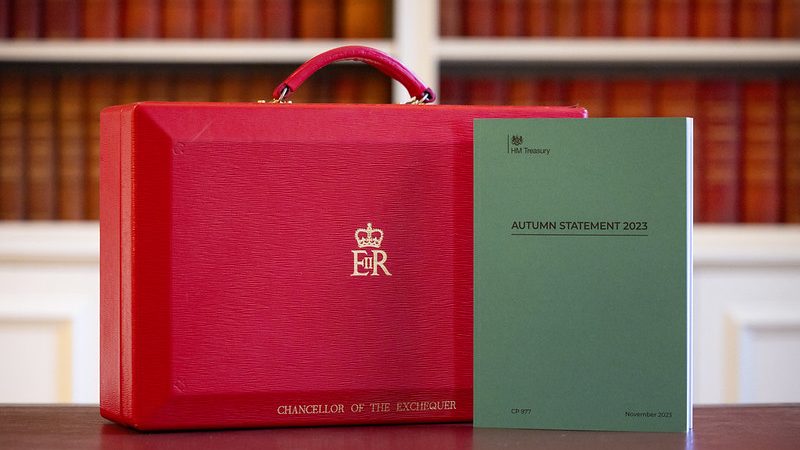We’re taking a look at what the Chancellor announced in his autumn statement 2023 and what this means for individuals and their businesses. You could definitely tell this was an autumn statement being made with an eye on next years’ general election – we take a look at the effects of what was announced.

National Insurance
From 6 January 2024 the rate of employee’s National Insurance contributions will be cut from 12% to 10% for earnings between £12,570 per annum and £50,270. The average salary in the UK is currently £35,400 and for someone earning that this NIC reduction will mean an extra £450 in their pocket per year.
The 2% rate for earnings over £50,270 will remain and there was no reduction to Employers NIC which will remain at 13.8%.
For the self-employed and partners in a business they need to wait a little longer for a reduction to their National Insurance. From 6 April 2024 it will fall from the current 9% to 8%. The weekly £3.45 Class 2 contributions will be abolished from that date, but if you have profits of less than £6,725 per annum you can elect to still pay these to retain benefits such as a qualifying year for state pension.
Full expensing
The Chancellor announced that full expensing originally which was intended to end in 2026 will be made permanent and means that for every £1 a business invests in plant and machinery or IT, it will get 25p tax relief. This is an incentive for big businesses who would exceed their Annual Investment Allowance which currently allows this treatment for up to £1m spent on qualifying plant and equipment, so for small businesses it is unlikely full expensing will be something they ever use.
R & D Claims
From 1 April 2024 the Small or Medium Enterprise (SME) Scheme will be merged with the Research and Development Expenditure Credit (RDEC) that large companies have applied. This will mean the credit arising from the claim will be shown as other income or as a reduction to the R&D costs, and this credit then subject to corporation tax. The current cap applied to the SME scheme linked to the PAYE & NIC will continue and the restriction to overseas R&D applied.
Last but not least…….
National Living Wage & National Minimum Wage
The Chancellor announced a 9.8% increase to the National Living Wage from 6 April 2024, meaning an hourly rate of £11.44. Previously the National Living Wage had only applied to over 23 years old but the Chancellor lowered this so that from 6 April 2024 it will apply to all workers aged 21 and over.
The National Minimum Wage for all those under the aged of 21 was also increased:
| Age | Old Rate | New rate | Change |
| 18 – 20 | £7.49 | £8.60 | 14.8% |
| Under 18 | £5.28 | £6.40 | 21.2% |
| Apprentice | £5.28 | £6.40 | 21.2% |
This will come as great news to millions of workers and the sentiment is absolutely spot on, but with no changes to the tax bands resulting in the Treasury taking 30% of this increase, and businesses likely to pass on the increase through raised prices thereby fuelling inflation – will anyone feel any better off? Will the Bank of England be forced to increase base rate further to combat inflation? Watch this space.
When changes like the Autumn Statement are announced, we at Veritons review the impact on all our clients to see if any changes to their plan of action are required. This is not something we offer for an additional fee, this is just part of the service. If you suspect you or your business may no longer be operating tax efficiently, why not book a free initial consultation with us. Get in touch by hitting the button below.
